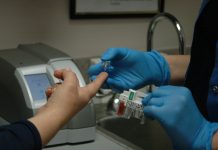
Congratulations on good control.
Have you tested your blood glucose 2 hours after meals (postprandial)? This may provide you an answer to feeling sleepy after breakfast, but not after dinner. Sleepiness is not usually a symptom of low blood glucose, a fainting feeling is. Have you discussed this with your doctor? If not bring it up your next visit.
Generally, a meal high in carbohydrates tends to make one sleepy and a meal high in protein tends to keep one awake. Breakfast meals tend to be higher in carbohydrates. Do you include meat or a meat substitute like an egg or peanut butter at breakfast? Does your dinner meal include more meat (3 ounces) than your breakfast (1 ounce)?
Overeating will also make one sleepy. After a meal, blood pools in the gastrointestinal area (stomach and intestines) to pick up nutrients from the food. This decrease in blood flow to the brain and extremities (legs and arms) can make you feel less alert mentally.
You did not mention whether or not you drink a caffeine-containing beverage at breakfast. Two cups of coffee (8 ounces of coffee has 95 milligrams of caffeine and 8 ounces of tea made from 1 tea bag, not herbal, has 47 milligrams of caffeine). Less than 200 milligrams per day is considered safe. Caffeine usually works within 20 minutes and the effects last 6 hours with the greatest effect within the first 3 hours. Drinking caffeinated beverages with breakfast may only mask the symptoms and not address the real reason you feel sleepy after breakfast.
Exercise will increase your level of alertness after a meal. Consider going for a walk after breakfast.
An A1c blood test (glycosylated hemoglobin) will tell what your blood glucose has been over the last 4 months. As red blood cells (RBC) are forming, glucose from the blood attaches to the cell wall. If your blood glucose is high when the red blood cells are forming, more glucose will attach. Red blood cells live 4 months and so glycosylated hemoglobin will reflect blood glucose over a longer period than a single fasting blood glucose that measures what glucose is in the blood at that specific moment. You should aim for an A1c <6.5.


